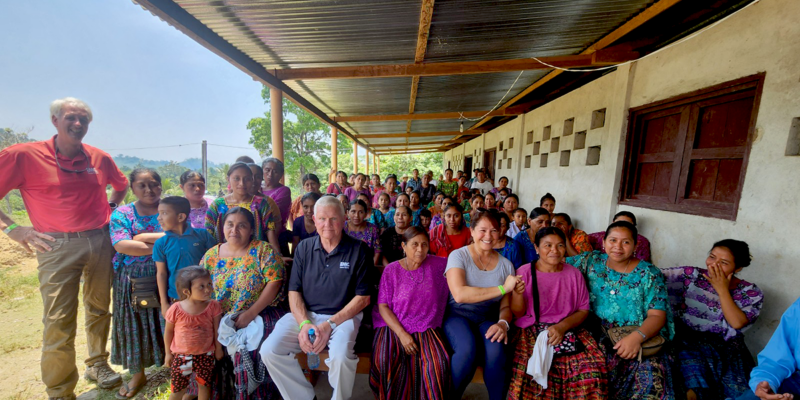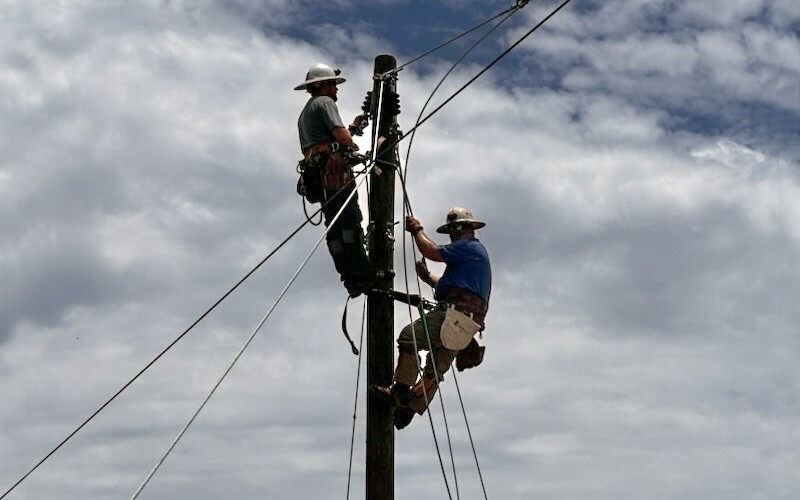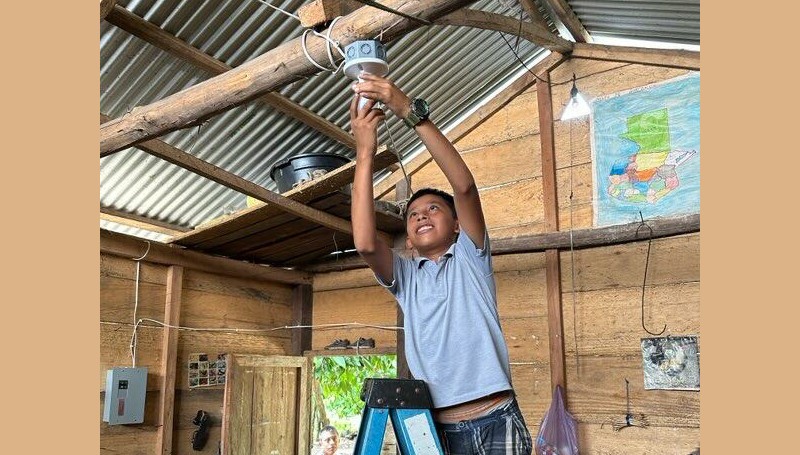Georgia Co-ops Complete Guatemalan Electrification Project

Last September, 15 volunteer line workers from seven Georgia electric cooperatives worked together to bring electricity for the first time to the rural village of Sesaltul in north-central Guatemala. CFC and NCSC were proud to provide $95,000 in grants to support the mission.
This was the 14th international electrification project completed by Georgia cooperatives since 2005, when volunteer line workers arrived in Costa Rica to tackle their first project. Since then, more than 100 Georgia line workers have traveled abroad to construct over 25 miles of primary line, bringing electricity to approximately 650 rural homes and businesses in Costa Rica, Boliva and Guatemala in projects organized by NRECA International.
“What better way to help others than by going back to our roots and providing electricity to those who have never had—and possibly never would have—electricity without this support?” said Chris Stephens, secretary/treasurer of the statewide association, Georgia Electric Membership Corporation (EMC), and president and CEO of Coweta-Fayette EMC. “Simply knowing that we can play a small role in improving the quality of life of these villagers, improving education and healthcare, and enhancing economic development opportunities is exciting, not to mention the gratification our linemen get from helping others and building lifelong co-op relationships.”
 Photos credit to Connor Hoff of Coweta-Fayette EMC.
Photos credit to Connor Hoff of Coweta-Fayette EMC.
Hot Climate Causes Challenges
Over 17 days, the Georgia volunteers constructed 4 miles of primary line and 2.5 miles of secondary line, installed six transformers, and wired and connected 90 homes, two schools and two churches—all without the benefit of bucket trucks, power tools and other equipment they are used to having back home.
“Though we were faced with a few obstacles throughout the project, we didn’t let them stand in our way,” said Matt Brown, crew foreman on the Sesaltul project and line foreman at Cobb EMC. “We knew we had our work cut out for us after reviewing the size of the project and based on not having the conveniences of modern tools and equipment. But our biggest challenge was the heat. With the temperatures reaching 90+ degrees and high humidity, staying healthy and hydrated was one of our biggest concerns.”
Before the crew’s arrival, the local utility, ADESMI, had set 53 primary poles, 19 secondary poles and dug in 87 anchors. Brown shared how it had to be extremely challenging for them due to the geography and location of the poles. The utility also helped by making sure the meter poles were set and wired for over 90 meters. ADESMI will be responsible for line and equipment maintenance going forward.
The Sesaltul villagers also helped keep the project on schedule.
“The local villagers were excited and ready to assist us in any way they could,” Brown said. “Though we were lucky to have the majority of primary line running along a paved road, that also meant we had traffic to contend with. We could always count on the locals to set up barricades and roadblocks when necessary. With a makeshift rig holding the wire reel in the back of a pickup truck, we also could rely on them to work alongside of us as we pulled out several miles of wire by hand. And with most of the homes off in the woods and difficult to find, we relied on them when it came to navigating or cutting our way through heavy vegetation to the hook-up spots.”
 Photos credit to Connor Hoff of Coweta-Fayette EMC.
Photos credit to Connor Hoff of Coweta-Fayette EMC.
Electricity Makes Life Easier
Each Sesaltul home received four lights, two switches and two outlets. But the benefits of electricity for the village go far beyond just lighting.
For example, one of the schools had a computer lab that ran off a generator, but the generator was not reliable. Now they have a reliable source of electricity that the teachers and children can use to improve education. Many households will benefit from the ability to use an electric hot plate to cook versus spending time collecting wood and cooking over open fires. The villagers also can grind corn much more efficiently, install pumps for running water versus having to collect and carry water back to the village, and they can use refrigeration to keep supplies of food for much longer periods.
For the Georgia line workers, one of the trip highlights was seeing the villagers’ reactions when the lights were turned on for the first time.
“Seeing the pure happiness and excitement the locals get when they finally have power is something that will change you forever,” said Connor Hoff, apprentice lineman at Coweta-Fayette EMC. “Having the opportunity to go on a trip like this is wonderful, and being able to bring electricity to these families’ homes is truly an honor. It is an experience I hope many more linemen are able to have!”
CFC and NCSC Grants Enable Project Success
“I am grateful for all the Georgia cooperatives that supported this effort either financially or by sending volunteers, and for CFC and NCSC for their financial contributions,” Stephens said. “The CFC and NCSC grants helped purchase the needed poles, wire and other materials. We would not have been able to complete the project without those grants.”
Stephens was also extremely grateful for the volunteers, who were willing to spend over two weeks working to construct new lines in a tough climate, all to improve the quality of the villagers’ lives.
“What we did was not a handout, it was a hand up,” Stephens added. “We gave the villagers a tool that will improve their lives. And from a community level, we created a strong bond between the co-ops. It reminds us of what our mission is and our responsibility to communities. It reinforces our commitment to improve the quality of life for local communities at home and abroad.”
Brown concluded, “It’s amazing that you can take 15 linemen from seven different co-ops, go to another country, formulate a plan and complete what, at first, seemed to be an overwhelming task. The motivation and drive that these volunteers put fourth was incredible. Without their knowledge and strong work ethic, this trip wouldn’t have been a success. This was an amazing experience we will always cherish. Thank you to everyone responsible for making this trip possible!”